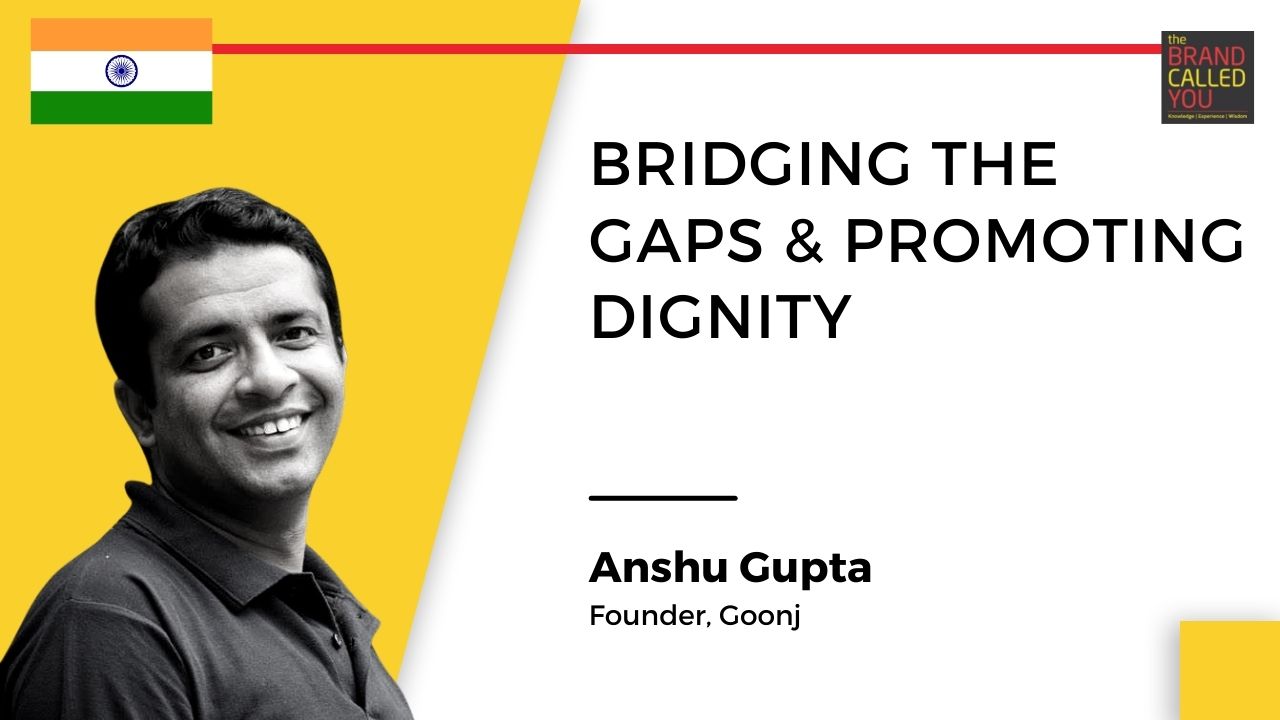Anshu Gupta, Founder, Goonj
Popularly known as the Clothing Man and the recipient of 2015 Ramon Magsaysay award, Anshu Gupta founded Goonj with a mission to highlight some basic but ignored needs of people on the development agenda, using clothing as a metaphor.
Podcast
Overview
Philanthropy
Defined as an act done for humanitarian purposes. However, it is also defined as a charitable donation to worthy causes on a large scale. This is where the NGO GOONJ comes to play its role, as a gap bridger between urban prosperity and rural poverty while shunning the idea of charity or donation.
The founder, Mr. Anshu Gupta keeps reiterating the fact that philanthropy is a two-way process. If the receiver gets material benefits for his/her growth the giver gets peace in return. It, in no way, makes the giver a superior being.
Let’s dive deep into the engaging conversation in today’s episode with The Brand Called You and redefine the meaning of philanthropy.
About Anshu Gupta:
Anshu Gupta, also known as the “Clothing man” is an Indian social entrepreneur who established GOONJ, a non-governmental organization based on the idea of utilizing the unused material of urban homes in the remote villages of India.
He has won the Ramsay Magasasay award in 2015 and has been the recipient of the Social Entrepreneur of the Year Award by the Schwab Foundation for Social Entrepreneurship in 2012.
His experiences in his corporate field and as a journalist inspired him to start an amazing organization that undertakes disaster relief, humanitarian aid, and community development across the country. He speaks about how it started with a simple yet so widely overlooked idea of providing clothing or rather utilising idle clothing in urban areas to give them a new life. He asserts the idea of considering both the giver and the receiver as stakeholders as opposed to donor and beneficiary. We talk about more such noble thoughts in our discussion.
Discussion:
In this interview, Mr. Gupta takes us through the journey of GOONJ right from the birth of the idea to the long way it has come today. He narrates two very specific instances that shook him to an extent that he had to come forward to do his bit for the society around him and his conscience.
In one such incident, he narrates how he once met a family of dead body pickers in Delhi & the little girl hugged the dead bodies in winters due to the lack of clothing.
And thus, the story of GOONJ started on the concept of a piece of cloth. It has gone on to become a massive disaster relief organisation, however, Mr. Gupta asserts how the organisation is working on changing the mindset of people by refraining from using certain terminology. He emphasises the importance of not considering oneself superior to the other if one gives away his/her idle belongings, money, or time. GOONJ believes that human beings are born with dignity & is based on the model that society either snatches or maintains and of course GOONJ believes in the latter.
“We should stop using the word donation because that is a wrong notion and wrong description. Whenever we give away our second-hand material, that means we are discarding it. We are giving it away largely because we don’t need it. Rather, we need to be thankful to the people who are using our second-hand material. We can’t create a halo here. Those people give a new life to something with which we are so emotionally attached or on which we have spent our hard-earned money.”
Promoting mutual growth
The idea of GOONJ is the promotion of mutual inclusivity where the village folks first participate themselves to resolve their local issues and are then aided by the organization with funds or logistic help. The model makes everyone a stakeholder.
They make conscious efforts to change the arrogance of the general public who believe to be superior if they give out anything. However, they are constantly battling the “I am helping someone” attitude. GOONJ’s efforts have resulted in promoting dignity in the literal sense.
Work during Pandemic
Goonj under the leadership of Mr. Gupta has done a commendable job during the pandemic. They battled the challenges that India’s diversity offers, for instance, the different food habits. They channelized their logistics by partnering with several grassroots organizations to reach the remotest parts of the country.
They worked towards marginalized missed out communities like transgenders, leprosy, devadasis, etc. He claims it to be one of the most fulfilling experiences.
“Imagine, India has about 800 odd colonies of people with leprosy. It is also one of the causes of disabilities. And we realized how people were forced to use kerosene or phenyl on their wounds because they were not getting any bandaids or any kind of ointments. The way things turned out and priorities changed at that time, we worked on medical kits for the first time., And it happened in volumes.”
He ends the conversation on a very introspective note mentioning how doing good is a collective work. One needs to think of it as a paying back opportunity.
He ends it on: “If you can’t lead something, stand with someone who is doing it. If nothing else, you’ll get a good sleep.”
Tune in to get inspired!


